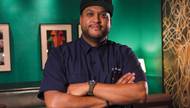Biology student Citlally Lopez wants to help medical patients every step of the way.
First comes communication. Her volunteer work in the main lobby at Sunrise Hospital allows her to observe and help many Spanish-speaking patients in a facility where, Lopez says, very few staff members speak the language.
Next up: treating the patient. As a junior at UNLV, the 21-year-old is involved in research to find a cure for cancer. Lopez recently received the Pfizer La Jolla Academic Industrial Relations Diversity Research Fellowship in Chemistry, a $20,000 scholarship that aims to diversify the field. According to Pew Research Center, women comprise 40% of the nation’s physical scientists and 48% of life scientists. And although Latino workers account for 17% of employment across all jobs, only 9% are in health-related jobs.
Lopez will present findings from more than seven months of research at Pfizer’s institution in La Jolla, California, in August. She says it took a while for her family to believe a woman, let alone a first-generation Mexican-American woman, has a place in research labs and in medical school. But with encouragement from her older sister, now studying to become a doctor in Reno, she was able to see herself in those roles and pursue scientific studies.
Amid working toward a cure for cancer, Lopez is studying to take the Medical College Admission Test (MCAT) in May. She says applying for medical school is “Plan A” but also hopes to continue on her research path. “Once you hear, ‘There’s no research on this disease. It’s over,’ that’s really tragic and disheartening,” Lopez says. “I want to be there to tell them, ‘I’m trying to find a cure right now to help you. Don’t give up.’”
What have you observed that has made you so empathetic for patients’ experiences? I used to volunteer in the emergency room pre-pandemic. I was interacting directly with the patients. Right from the moment they come in, I see their fear. From the moment they get signed in, I see the relief, “Someone’s here to help me.” Then they see the doctor, [and] then there’s that relief again.
It can be good or bad. I either see them leave in tears … [or] come out really happy and relieved. I think, when you’re treating a lot of people, you [can] tend to disassociate. But it can also be hard to do that, when you’re directly face to face with them and you’re seeing that they are human beings, and they deserve the best care.
You’re looking for a cure for cancer, preparing for medical school and maintaining a perfect grade-point average and attendance. How do you balance it all? It’s a lot of studying for classes. And another aspect of it is the research. Unfortunately, an experiment can’t be done in 20 minutes—it can run for hours. What I tend to do is start an experiment and during that experiment time, I start to study. And once I need to, for example, go back to my experiment to purify or something, I focus completely on what I am doing.
I think a large aspect of why I’m able to balance is because I do make time for friends and family. I feel like if I didn’t have that free time or hobbies, I’d probably go crazy.
How do cultural and language barriers play out in a health care setting? I’ve volunteered at Sunrise Hospital—it’s near where I live—and there’s a large population of minorities, mainly Spanish speakers. Most of the staff, when I’m volunteering there, does not speak Spanish. The Spanish speakers are really concerned, trying to find out what to do. They’re scared. But how do you express to someone, “I’m feeling something in my throat.” You can always motion to it, but you can’t specifically tell them what [is wrong], without that language.
Just recently, my brother was in the hospital. There was a security guard there, and he was a non-Spanish speaker. I remember him telling me, “Only your mom can go in, because this is a serious issue.” And I said my mom doesn’t speak English well. He said, “She was speaking English just fine to me.” He didn’t respect the idea that she’s mainly a Spanish speaker. If the doctor [is] speaking in scientific terms, she’s not going to understand that. That further motivated me—this lack of sympathy for someone who doesn’t speak your language.
Has your family changed their tune, now that they see you have a knack for scientific research and medical studies? They’re definitely really proud. I did an interview for Telemundo, and they’re purposely looking out for that one. And they have also said, it really helps [to see] a Mexican [woman] is doing something that they never thought was possible—for something as big as cancer.
Click HERE to subscribe for free to the Weekly Fix, the digital edition of Las Vegas Weekly! Stay up to date with the latest on Las Vegas concerts, shows, restaurants, bars and more, sent directly to your inbox!





